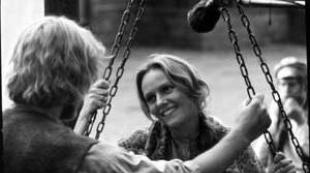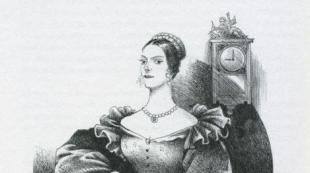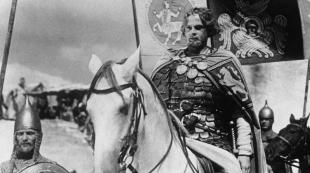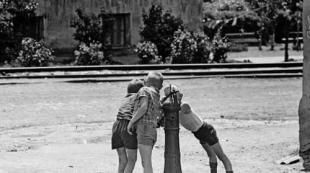Leskov). Analysis of the work "Lady Macbeth of the Mtsensk district" (NS Leskov) Important details of the analysis of "Lady Macbeth of the Mtsensk district"
Why does this myth still exist?
Maybe because we are "lazy and incurious" (AS Pushkin)?
Every year, articles about the atrocious murders committed by Katerina Izmailova from the Leskov story, in the house on Lenin, 10, in the police building (GROVD), appear on the Internet and in the media.
Photo from the site autotravel.org.ru.
1. What Leskov himself wrote about the story "Lady Macbeth".
December 7, 1864 Leskov sent the manuscript of the recently written novel "Lady Macbeth of Our District" from Kiev to the editorial office of the "Epoch" magazine with a letter addressed to N. N. Strakhov, which said: “I am sending ... in a special package to the editorial office, but in your own name, and I ask you for your attention to this little work. "Lady Macbeth of Our County" is the 1st issue of a series of essays exclusively some typical female characters of our (Oka and part of the Volga) area ... All such essays I propose to write twelve, each in the volume of one to two sheets, eight from the folk and merchant life and four from the nobility. "
So, Leskov himself talks about typification - creating a collective image that embodies certain qualities on which the writer focuses attention. In short, Katerina Izmailova is in the same rank as Chichikov, Plyushkin, the Karamazov brothers and other characters in Russian literature.
Illustration for "Lady Macbeth of the Mtsensk District" by NS Leskov. Artist B. Kustodiev
Perhaps the story reflected one of Leskov's early Oryol impressions, which later came to his memory: "Once to an old neighbor who" healed "over seventy years and went to rest under a black currant bush on a summer day, an impatient daughter-in-law poured boiling wax into his ear ... I remember how he was buried ... His ear fell off ... Then the executioner tormented her on Ilyinka (in the square). She was young, and everyone wondered how white she was ... "("How I Learned to Celebrate. From the Writer's Childhood Memories." Manuscript at TsGALI).
Leskov, as you know, for a long time served as an assessor of the Oryol Chamber of the Criminal Court, besides, he traveled a lot around the country, so of course he knew many such cases. It was not at all necessary for the murder described in the essay to take place in Mtsensk.
In a letter to D.A.Linev dated March 5, 1888, Leskov wrote : "The world that you describe<т. е. жизнь каторжников>, I do not know, although I touched it slightly in the story "Lady Macbeth of the Mtsensk District". I wrote, as they say, "
out of my head ",not observing this environment in nature, but the late Dostoevsky found that I had reproduced reality quite correctly "("Zvezda", 1931, No. 2, p. 225).
2. Merchants Izmailovs - were there any such in Mtsensk before 1917?
But maybe Leskov took the real names, surnames and biographies of the Mtsensk merchants as the basis of the work of art?
I was not lazy and looked through all the memorable books I have on the Oryol province for the "presence" of the Izmailov merchants in Mtsensk, namely for: 1860, 1880, 1897, 1909, 1910, 1916. The result surpassed all expectations: during all this time, only one merchant, Vasily Matveyevich Izmailov (in 1909 and 1910) was mentioned, and he lived in Yamskaya Sloboda, i.e. very far from Lenin's houses 8-10 - on the other side of town.
Address-calendar and memorable book of the Oryol province for 1910, p. 257.
Merchants Ershov, Inozemtsevs, Pavlovs, Smirnovs, Polovnev and only one Izmailov(and that one is "not that one"). In the "Oryol Diocesan Gazette" of the beginning of the century, almost the same merchants are mentioned as headmen of the Mtsensk churches - and again not a single Izmailov.
Mtsensk merchants, the beginning XX century.
Of course, on the basis of this, it cannot be argued that there were no more of them in Mtsensk at all. But in historical documents there is no no confirmation the fact that in reality Zinovy Izmailov and his wife Ekaterina Lvovna existed.
3. Who is spreading the myths?
Why am I talking about this obvious nonsense in such detail? Then, the myth about the house at 8-10 Lenin Street is already so “fat” that there are, it turns out, “relatives” of Zinovy Borisovich. For example, Boris Novoselov, a resident of Mtsensk, states in the newspaper “ Moscow's comsomolets"(07.11.-14.11.2001), that he is a cousin in the fourth generation of that same Zinovy Borisovich Izmailov (evaluate the degree of" kinship "). He talks about the ghosts that roam the house and claims that after the death of Izmailov, the house was confiscated by the city authorities. There is also the Panov family ("great-great-grandchildren"), whom Katerina Lvovna "jinxed" and "from her all the misfortunes." And the local police in general constantly heard noise and "voices". It seems to me that the author of the article, Irina Bobrova, did not even leave her office, and the “relatives” described by her were from the same fictional range as the “ancestors”.
Houses 8-10 in 2009. Photo by Alexander Dvorkin (photogoroda.com).
It says: "Home where presumably there was a tragedy described by Leskov ... "
One can understand why non-local journalists compose fairy tales, but our local historians gave them a reason. We open the famous book "In the center of Russia" by A.I. Makashov and in Chapter 5 we read:
“One of the two GROVD buildings belonged to the famous merchants Izmailovs. It was here that the tragedy of love and blood took place, which gave the great Russian writer NS Lesnoy a plot for his famous "Lady Macbeth of the Mtsensk District". Excursions often come here to get acquainted with a building that is peculiar in its architectural plan, to listen to a story about the Izmailovs and that era. After all, Katerina Izmay-lova, the heroine of a terrible drama, is a real face. "
Even Moskovsky Komsomolets made a reservation in that article: “Historically, the plot of the work of Nikolai Leskov not confirmed anywhere”, And Makashov confidently repeats the urban legend.
V.F. Anikanov, unlike him, does not invent hypotheses:
« 1782 year. The house of the merchants Pchelkin - Inozemtsev was built. During the repair, a brick with an imprint of the year of manufacture was found. Now this building belongs to the city district department of internal affairs. " "During the renovation of the building in 1960, a brick with an imprint of the year of manufacture - 1782 - and a large archive of merchants Inozemtsev-Pchelkin were found in the wall."
So - and Anikanov does not have any mention of Lady Macbeth, but why, if this is a literary character?
Part of the composition around the monument to Leskov in Oryol - Lady Macbeth of the Mtsensk district.
The list of cultural heritage sites of Mtsensk ( cultural passport on the administration website, but there are also other sites) Lenin's house, 8 is recorded as "the house of the merchant Izmailov", however, with a proviso: S. Leskov a plot for his famous story "Lady Macbeth of the Mtsensk District". But this is not confirmed no historical documents. This can only be talked about at the level folk legend. »
Lenin, 8. 1945 to 1981 the city executive committee was located in this building. Since then and to this day - the police (police).
Nearby house number 10 is included in this list as the "House of the merchant Svechkin". Both buildings are architectural monuments of the regional level.
Lenin building, 10, built in 1782. Also - one of the police corps.
4. Who actually owned the Lady Macbeth house before 1917?
Houses 8, 10 on Lenin Street (Staromoskovskaya) really belonged to the merchants Inozemtsevs - they are mentioned in pre-revolutionary sources. Before the revolution, two brothers lived there - Panteleimon Nikolaevich and Mitrofan Nikolaevich Inozemtsevs, this is their archive and was found during the renovation of the GROVD building in 1960.
The information is one hundred percent, from their descendant.
Habout this - some other time ...
Post Scriptum.
The 1989 film Lady Macbeth of the Mtsensk District was filmed in the Moscow region: “We worked in Pushchino, 110 km from Moscow. The scenery was built on the banks of the Oka. " (interview with director R. Balayan).
Sources.
1) N. S. Leskov. Collected works in 11 volumes. Moscow: State Publishing House of Fiction, 1957.
2) N. S. Leskov. Collected works in three volumes, Fiction, 1988.
In 1864, an essay by Nikolai Leskov appeared in the Epoch magazine, based on the real story of a woman who killed her husband. After this publication, it was planned to create a whole series of stories dedicated to the fatal fate of women. The heroines of these works were supposed to be ordinary Russian women. But there was no continuation: the Epoch magazine was soon closed. A summary of "Lady Macbeth of the Mtsensk District" - the first part of the failed cycle - is the topic of the article.
About the story
This work was called an essay by Nikolai Leskov. "Lady Macbeth of the Mtsensk District", as already mentioned, is a work based on real events. However, it is often called a story in the articles of literary critics.
What is Lady Macbeth of Mtsensk about? Analysis of a work of fiction involves the presentation of the characteristics of the main character. Her name is Katerina Izmailova. One of the critics compared her to the heroine of Ostrovsky's drama "The Thunderstorm". Both the first and the second are married to an unloved person. Both Katerina from "The Groza" and Leskova's heroine are unhappy in their marriage. But if the first is not able to fight for her love, then the second is ready for anything for the sake of her happiness, which is described in a short summary. "Lady Macbeth of the Mtsensk District" is a work, the plot of which can be summarized as follows: the story of a woman who got rid of her husband for the sake of an unfaithful lover.
The fatal passion, pushing Izmailova to a crime, is so strong that the heroine of the work hardly evokes pity even in the last chapter, which tells about her death. But without getting ahead of ourselves, let us present a summary of "Lady Macbeth of the Mtsensk District", starting with the first chapter.

Characteristics of the main character
Katerina Izmailova is a stately woman. Has a pleasant appearance. A summary of "Lady Macbeth of the Mtsensk District" should begin to retell with a description of Katerina's short life together with her husband, a wealthy merchant.
The main character is childless. Father-in-law Boris Timofeevich also lives in her husband's house. The author, talking about the life of the heroine, says that the life of a childless woman, and even with an unloved husband, is completely unbearable. As if justifying the future killer Leskov. "Lady Macbeth of the Mtsensk District" begins with the departure of Zinovy Borisovich - Katerina's husband - to the mill dam. It was during his departure that a young merchant's wife began an affair with an employee Sergei.

Beloved Katerina
It is worth saying a few words about Sergei, the second protagonist of the story "Lady Macbeth of the Mtsensk District". Analysis of Leskov's work should be done only after careful reading of the literary text. Indeed, already in the second chapter, the author tells briefly about Sergei. The young man does not work for long for the merchant Izmailov. Just a month ago, before the events described by Leskov, he worked in another house, but was expelled for having an affair with the mistress. The writer creates the image of a femme fatale. And she is opposed by the character of a cunning, mercantile and cowardly man.

Love connection
The story "Lady Macbeth of the Mtsensk District" tells about the fatal passion. The main characters - Katerina and Sergei - indulge in love pleasures during the departure of their husband. But if a woman seems to be losing her head, then Sergei is not so simple. He constantly reminds Katherine of her husband, depicts bouts of jealousy. It is Sergei who pushes Katerina to the crime. Which, however, does not justify it in any way.
Izmailova promises her lover to get rid of her husband and make him a merchant. It can be assumed that the employee originally hoped for this when he entered into a love affair with the hostess. But suddenly the father-in-law finds out about everything. And Katerina, without thinking twice, pours rat poison into Boris Timofeevich's food. With Sergey's help, he hides the body in the basement.

Husband murder
The husband of the unfaithful soon "goes" to the same basement. Zinovy Borisovich has the imprudence to return from a trip at the wrong time. He learns about his wife's betrayal, for which he is subjected to cruel reprisals. Now, it would seem, everything is going the way the criminals wanted. Husband and father-in-law in the basement. Katerina is a rich widow. She has only, for the sake of decency, to wait a while, and then she can safely marry a young lover. But unexpectedly another character from the story "Lady Macbeth of the Mtsensk District" comes to her house.
Reviews of critics and readers about Leskov's book indicate that, despite the cruelty of the heroine, she evokes, if not sympathy, then some pity. After all, her further fate is tragic. But the next crime she commits after the murder of her husband and father-in-law makes her one of the most unattractive characters in Russian literature.

Nephew
The new character of Leskov's essay is Fyodor Lyapin. The boy comes to visit his uncle's house. The nephew's money was in the merchant's turnover. Either out of mercantile considerations, or perhaps out of fear of being exposed, Katerina goes to a more terrible crime. She decides to get rid of Fedor. At the very moment when she covers the boy with a pillow, people begin to burst into the house, suspecting that something terrible is happening there. This knock on the door symbolizes the complete moral fall of Katherine. If the murder of an unloved husband could somehow be justified by passion for Sergei, then the death of a young nephew is a sin, for which a cruel punishment should follow.
Arrest
The essay "Lady Macbeth of the Mtsensk District" tells about a strong, strong-willed woman. When the lover is taken to the station, he confesses to the murders. Katerina is silent to the last. When it makes no sense to deny, the woman confesses that she killed, but did it for the sake of Sergei. The young man causes some pity among the investigators. Katerina is just hate and disgust. But the merchant widow worries about only one thing: she dreams of getting to the stage as soon as possible and being closer to Sergei.
Conclusion
Once on the stage, Katerina is constantly looking for meetings with Sergei. But he finds it difficult to be alone with her. He is no longer interested in Katerina. After all, she is no longer a rich merchant's wife, but an unfortunate prisoner. Sergei quickly finds a replacement for her. In one of the cities a party from Moscow adjoins the prisoners. Among them is the girl Sonetka. Sergei falls in love with a young lady. When Izmailova finds out about the betrayal, she spits in his face in front of other prisoners.
In conclusion, Sergei becomes a completely different person. And it is in the last chapters that Katerina is able to evoke sympathy. The former employee not only finds a new passion, but also mocks his former lover. And once, in order to take revenge on her for a public insult, Sergei, along with his new friend, beats a woman.
Death
Izmailova, after Sergei's betrayal, does not go into hysterics. She only needs one evening to cry all the tears, the only witness of which is the prisoner Fiona. The day after the beating, Izmailov seems extremely calm. She pays no attention to Sergey's mockery and Sonetka's giggling. But, seizing the moment, he pushes the girl and falls with her into the river.
The suicide of Katerina became one of the reasons for critics to compare her with the heroine of Ostrovsky. However, this is where the similarities between these two female images end. Rather, Izmailova resembles the heroine of Shakespeare's tragedy, a work to which the author of the essay "Lady Macbeth of the Mtsensk District" makes an allusion. Cunning and willingness to do anything for the sake of passion - these features of Katerina Izmailova make her one of the most unpleasant literary characters.
The heroine of Leskov's story is clearly opposed by the author to Katerina Kabanova from Ostrovsky's The Thunderstorm. The heroine of Ostrovsky's genius drama does not merge with everyday life, her character is in sharp contrast with the prevailing everyday habits ... According to the description of Katerina Izmailova's behavior, no one under any circumstances would have determined which young merchant woman is being told about. The drawing of her image is a household template, but a template drawn with such thick paint that it turns into a kind of tragic splint.
Both young merchant wives are weighed down by the "bondage", the frozen, predetermined way of life of the merchant family, both are passionate natures, going to the limit in their feelings. In both works, the love drama begins at the moment when the heroines are seized by a fatal, illegal passion. But if Katerina Ostrovsky perceives her love as a terrible sin, then something pagan, primitive, “decisive” awakens in Katerina Leskova (it is no coincidence that her physical strength is mentioned: “in girls, passion was strong ... not even a man could overcome everyone”). For Katerina Izmailova, there can be no opposition, she is not even afraid of hard labor: "with him (with Sergei), her hard labor path blooms with happiness." Finally, the death of Katerina Izmailova in the Volga in the finale of the story brings to mind the suicide of Katerina Kabanova. Critics also rethink the characterization of the island heroine "a ray of light in the dark kingdom" given by Dobrolyubov:
“It could be said about Katerina Izmailova that she is not a ray of the sun falling into the darkness, but lightning generated by the darkness itself and only brighter emphasizing the impenetrable darkness of merchant life” (V. Gebel).
Dramatizations
- plays:
- - staged by Lazar Petreiko
- 1970s - staged by A. Wiener
- - opera "Lady Macbeth of the Mtsensk District" (in a later version - "Katerina Izmailova") by D. D. Shostakovich
- 1970s - musical drama "My Light, Katerina" by G. Bodykin
Theater performances
- - Studio Dikiy, Moscow, director Alexey Dikiy
- 1970s - reading performance by A. Vernova and A. Fedorinov (Mosconcert)
- - Prague youth theater "Rubin", director Zdenek Potuzhil
- - Moscow Academic Theater. Vl. Mayakovsky, in the role of Katerina - Natalia Gundareva
- - Yekaterinburg State Academic Drama Theater, staged by O. Bogaev, director Valery Pashnin, Irina Ermolova as Katerina
- - Moscow theater under the direction of O. Tabakov, director A. Mokhov
Screen adaptations
Literature
- Anninsky L.A. World celebrity from the Mtsensk district // Anninsky L.A. Leskovskoe necklace. M., 1986
- Guminsky V. Organic interaction (from "Lady Macbeth ..." to "Cathedrals") // In Leskov's world. Digest of articles. M., 1983
Notes (edit)
Links
| Works Scarecrow Emptyflies Journey with a nihilist Robber Rakushanskiy melamed Russian democrat in Poland Russian secret marriage Siberian pictures of the 18th century Synodal philosopher Descent into hell A just man Old genius A languishing spirit Stupid artist Figure Man on a clock Chertogon Sheramur Darning Yudol Stinging | |
|---|---|
| Legends and legends |
Ascalon villain Bramadat and Radovan Mountain Lion of Elder Gerasim Lefty Legends of conscientious Danil Leon butler son Malanya - head of ram Innocent Prudence Beautiful Aza The Legend of Fyodor the Christian and about his friend Abram the Jew, Skomorokh Pamphon of God Christ as a guest of the man |
| Journalism | Bishops' Tours Jew in Russia Diocesan Court Caricature Ideal Legendary Characters Trifles of Bishop Life About Russian Icon Painting Russian Public Notes Senichkin Poison |
| Dramaturgy | Waster |
Leskov's story "Lady Macbeth of the Mtsensk District" is an interesting story that can be read in one breath, however, for those who do not have time to read the full version, we invite you to get acquainted with Leskov's work "Lady Macbeth of the Mtsensk District" in a summary. An abbreviated version of Leskov's work "Lady Macbeth" will make it possible to analyze the story.
Leskov Lady Macbeth summary
So, Lady Macbeth Leskova is the main character. "She looks like a nice woman," who was twenty-three years old. She is married to a fifty-year-old merchant Zinovy Borisovich Izmailov, with whom they live in a well-to-do house. Father-in-law Boris Timofeevich lives with them. She and her husband have been together for five years, but they did not have children, and with all the contentment, Lady Macbeth's life with her unloved husband was the most boring. The husband left for the mill every day, the father-in-law was also busy with his own business, and Lady Macbeth had to wander around the house, suffering from loneliness. And only in the sixth year of life with her husband, Ekaterina Lvovna underwent changes. She met Sergei. It happened at a time when the mill dam burst and my husband had to spend there not only daytime, but also nighttime.
Further, Leskov's work "Lady Macbeth of the Mtsensk District" continues with the acquaintance of the hostess with Sergei, who was kicked out of service by the past owner because of his relationship with his wife. Now he served with Izmailov. Having met by chance, the hostess could not resist Sergey's compliments, and when he came to her in the evening, she could not resist kisses. A romance began between them.
But Ekaterina Lvovna did not manage to hide her connection with Sergei for long, because a week later her father-in-law noticed a clerk coming down the pipe. Boris Timofeevich grabbed Sergei, whipped him and locked him in the pantry. He threatened his daughter-in-law that he would tell everything to her husband. Further in the work of Leskov, Lady Macbeth decides to take a desperate step. She decided to poison her father-in-law by adding rat poison to the mushrooms. By the morning the father-in-law was gone. Boris Timofeevich was buried, and the hostess and her lover continued their relationship. However, it is not enough for Sergei to be a lover, and he begins to tell Catherine how he would like to become her husband. Catherine promises to make him a merchant.
Just then the husband comes home, who begins to accuse his wife of treason, because the whole district is talking about this. Catherine is not embarrassed, and in front of her husband's eyes she kisses the clerk, after which they kill Zinovy Borisovich, burying him in the cellar. The whole district is looking for the owner, but they never find it, and Catherine, as a widow, begins to manage the estate and is expecting a child who will be the heir.
The next victim of Sergei and the merchant's wife was the six-year-old nephew of Izmailov, in whom Catherine saw a rival for the unborn child. After all, only her child was to become the sole heir. But the problem was quickly resolved. She could not afford to “lose her capital” because of some boy, so on a holiday, after waiting for the aunt to go to church, she and Sergei strangle the child. Only this time they failed to do everything without noise and witnesses.
Sergei was taken to the unit, where he confessed to all the crimes, calling Ekaterina Lvovna his accomplice. At the confrontation, the merchant's wife confessed to what she had done.
The story ends with the fact that Lady Macbeth gave birth to a child and abandoned him, giving the heir to be raised by a relative of her husband. After, the criminals were sent to Siberia to hard labor. But Ekaterina Lvovna was still happy because she and Sergei were in the same game. Only Sergei became cold to Catherine, and then there were new girls who came to them with a new party. Among them was Fiona, with whom Sergei cheated on Catherine, and then the guy started a relationship with the second girl Sonetka, while the merchant Sergei began to declare that he had never loved her and was with her for the sake of money. The whole party begins to mock Ekaterina Lvovna.
The image of Lady Macbeth is well known in world literature. N.S. Leskov. His work "Lady Macbeth of the Mtsensk District" is popular to this day and has many performances and film adaptations.
"Lady Macbeth of our county" - under this name the work first appeared in print in the magazine "Epoch". The work on the first edition of the essay lasted about a year, from 1864 to 1865, the final title of the work was given in 1867 after significant copyright changes.
It was assumed that this story would open a cycle of works about the characters of Russian women: landowner, noblewoman, midwife, but for a number of reasons the plan was not implemented. At the heart of "Lady Macbeth" is the plot of the widespread popular prints picture "About a merchant's wife and a clerk."
Genre, direction
The author's definition of the genre is an essay. Perhaps Leskov with this designation emphasizes the realism, authenticity of the narrative, since this prose genre, as a rule, relies on facts from real life, is documentary. It is no coincidence that the first name of the county is ours; after all, every reader could imagine this picture in his own village. In addition, it is the essay that is characteristic of the direction of realism, which was popular in Russian literature of that time.
From the point of view of literary criticism, "Lady Macbeth of the Mtsensk District" is a story, as indicated by the complex, eventful plot and composition of the work.
Leskov's essay has much in common with Ostrovsky's drama "The Thunderstorm", written 5 years before "Lady ..."
The essence
The main events take place in a merchant family. Katerina Izmailova, while her husband left on business, starts an affair with the clerk Sergei. The father-in-law tried to stop debauchery in his own house, but paid for it with his life. The spouse who returned home also received a "warm welcome". Having got rid of the hindrances, Sergey and Katerina enjoy their happiness. Soon Fedya's nephew comes to visit them. He can claim Katerina's inheritance, because the lovers decide to kill the boy. The scene of the strangulation is seen by passers-by who walked from the church.
The main characters and their characteristics
- Katerina Izmailova- a very complex image. Despite countless crimes, she cannot be considered an exclusively negative character. Analyzing the character of the main character, one cannot ignore the unfair accusations of her infertility, the contemptuous attitude of her father-in-law and her husband. All the atrocities were committed by Katerina for the sake of love, only in her she saw salvation from that nightmare life, which was filled only with cowardice and boredom. This is a passionate, strong and gifted nature, which, unfortunately, was revealed only in a crime. At the same time, we can note the statement, cruelty and unscrupulousness of a woman who raised her hand even against a child.
- Bailiff Sergei, an experienced "devichur", cunning and greedy. He knows his merits and is familiar with women's weaknesses. It was not difficult for him to seduce a rich mistress, and then deftly manipulate her, just to take over the ownership of the estate. He loves only himself, and only enjoys ladies' attention. Even in hard labor, he seeks amorous adventures and buys them at the price of the sacrifice of his mistress, begging her for what is valued in prison.
- Husband (Zinovy Borisovich) and Katerina's father-in-law (Boris Timofeevich)- typical representatives of the merchant class, callous and rude inhabitants, who are only engaged in enrichment. Their harsh moral foundations rest only on the unwillingness to share their goods with anyone. The spouse does not value his wife, he just does not want to give his thing. And his father is also indifferent to the family, but he does not want unflattering rumors circulating in the district.
- Sonnet... A cunning, quirky and flirtatious convict who is not averse to having fun even in hard labor. With Sergei, she is related to frivolity, because she never had firm and strong attachments.
Themes
- Love - the main theme of the story. It is this feeling that pushes Katerina to monstrous murders. At the same time, love becomes the meaning of life for her, while for Sergei it is just fun. The writer shows how passion can not elevate, but humiliate a person, plunge it into the abyss of vice. People often idealize feelings, but the danger of these illusions cannot be ignored. Love can not always be an excuse for a criminal, liar and murderer.
- A family... Obviously, it was not for love that Katerina married Zinovy Borisovich. During the years of family life, there was no proper mutual respect and harmony between the spouses. Katerina heard only reproaches in her address, she was called "non-native". The contractual marriage ended tragically. Leskov showed what the neglect of interpersonal relationships within the family leads to.
- Revenge... For the orders of that time, Boris Timofeevich quite rightly punishes the lustful clerk, but what is Katerina's reaction? In response to the bullying of her lover, Katerina poisons her father-in-law with a lethal dose of poison. The desire for revenge is motivated by the rejected woman in the episode at the crossing, when the current convict attacks the homeless woman Sonetka.
Problems
- Boredom. This feeling arises in heroes for a number of reasons. One of them is lack of spirituality. Katerina Izmailova did not like to read, and there were practically no books in the house. Under the pretext of asking for a book, and Sergei penetrates to the hostess on the first night. The desire to bring some variety to a monotonous life becomes one of the main motives for betrayal.
- Loneliness. Katerina Lvovna spent most of her days in complete solitude. The husband had his own business, only occasionally he took her with him, going to visit his colleagues. There is no need to talk about love and understanding between Zinovy and Katerina either. This situation was aggravated by the absence of children, which saddened the main character as well. Perhaps, if the family paid her more attention, affection, participation, then she would not have responded to loved ones with betrayal.
- Self-interest. This problem is clearly indicated in the image of Sergei. He masked his selfish goals with love, trying to evoke pity and sympathy from Katerina. As we learn from the text, the careless clerk already had a sad experience of courting a merchant's wife. Apparently, in the case of Katerina, he already knew how to behave and what mistakes to avoid.
- Immorality. Despite the ostentatious religiosity, the heroes stop at nothing in achieving their goals. Treason, murder, attempted murder of a child - all this fits into the head of an ordinary merchant's wife and her accomplice. It is obvious that the way of life and customs of the merchant province corrupts people secretly, because they are ready to commit a sin, so that no one knows about it. Despite the strict patriarchal foundations prevailing in society, the heroes easily commit crimes, and their conscience does not torment them. The moral problematics opens before us the abyss of the fall of the personality.
the main idea
With his work, Leskov warns of what kind of tragedy an ossified patriarchal life and a lack of love and spirituality in the family can lead to. Why did the author choose the merchant environment? In this class, there was a very large percentage of illiteracy, merchants followed age-old traditions that could not fit into the modern world. The main idea of the work is to point out the catastrophic consequences of lack of culture and cowardice. The lack of internal morality allows the heroes to commit monstrous crimes, which can be redeemed only by their own death.
The actions of the heroine have their own meaning - she rebelles against conventions and boundaries that prevent her from living. Her cup of patience is overflowing, but she does not know how and with what to draw it out. Ignorance is compounded by depravity. And now the very idea of protest is vulgarized. If at first we empathize with a single woman who is not respected and insulted in her own family, then in the end we see a completely decomposed personality who has no way back. Leskov urges people to be more selective in the choice of means, otherwise the goal is lost, but the sin remains.
What does it teach?
"Lady Macbeth of the Mtsensk District" teaches one main folk wisdom: you cannot build your happiness on someone else's misfortune. Secrets will be revealed, and you will have to answer for what you have done. Relationships created at the expense of other people's lives end in betrayal. Even a child, the fruit of this sinful love, is no longer needed by anyone. Although earlier it seemed that if Katerina had children, she could be quite happy.
The work shows that an immoral life ends in tragedy. The main character is overcome by despair: she is forced to admit that all the crimes committed were in vain. Before her death, Katerina Lvovna tries to pray, but in vain.
Interesting? Keep it on your wall!








